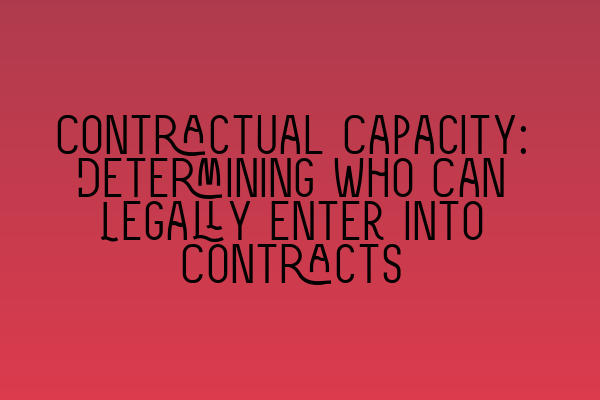As a solicitor, one of the fundamental aspects of contract law that I often come across is the issue of contractual capacity. Determining who has the legal right to enter into contracts is crucial in ensuring the validity and enforceability of agreements. In this blog post, I will explore the concept of contractual capacity and discuss how it is determined.
What is Contractual Capacity?
Contractual capacity refers to a person’s legal ability to enter into a binding contract. Not everyone can enter into a contract, as there are certain prerequisites that must be met. These prerequisites are designed to protect individuals who may be vulnerable or lack the necessary understanding to make informed decisions.
There are generally three categories of individuals when it comes to contractual capacity:
- Adults of sound mind
- Minors
- Individuals with mental incapacity
Adults of Sound Mind
Adults of sound mind are considered to have full contractual capacity. This means that they have the legal right to enter into contracts and are bound by the terms of those agreements. An adult is typically someone who has reached the age of majority, which is usually 18 years old.
However, it’s important to note that there are exceptions to this general rule. For example, if someone is declared mentally incompetent by a court, they may lose their contractual capacity.
Minors
Minors, or individuals who are under the age of majority, generally lack contractual capacity. The rationale behind this rule is that minors may not have the necessary maturity or understanding to fully comprehend the consequences of their actions.
Although minors cannot enter into binding contracts, there are certain exceptions to this rule. For instance, contracts for necessities such as food, clothing, and shelter are generally enforceable against minors. Additionally, contracts entered into by minors for educational purposes or employment are often considered valid.
If you’d like to test your knowledge on contractual capacity, check out our SQE 1 practice exam questions or our SQE 1 practice mocks FLK1 FLK2.
Individuals with Mental Incapacity
Individuals who have been declared mentally incapacitated by a court also lack contractual capacity. Mental incapacity refers to a condition that prevents a person from understanding the nature and consequences of their actions.
In cases of mental incapacity, contracts entered into by the individual are generally considered voidable. This means that the contract is initially binding, but the incapacitated party has the option to either affirm or disaffirm the agreement once they regain capacity.
If you’re preparing for the SQE 2 exam, you might find our SQE 2 preparation courses helpful!
Conclusion
In conclusion, contractual capacity plays a crucial role in determining who can legally enter into contracts. Adults of sound mind generally have full contractual capacity, while minors and individuals with mental incapacity have limited or no capacity.
Understanding the concept of contractual capacity is important for both individuals entering into contracts and legal professionals. By knowing who has the legal right to enter into a contract, we can ensure that agreements are valid and enforceable.
If you’re interested in knowing more about the SQE exams and their dates, check out our article on SRA SQE exam dates.
Thank you for reading and if you have any questions or need further guidance, please don’t hesitate to contact us.
